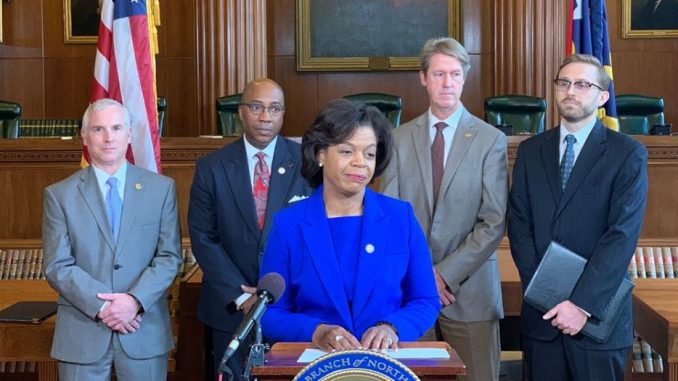
RALEIGH — During the second week of March, local court, school, law enforcement, juvenile justice and county officials from Cherokee, Clay, Haywood and Graham counties met for ceremonial signings of the School Justice Partnership Memorandums of Understanding.
The School-Justice Partnership is a program whose goal is to reduce the number of juvenile referrals to the court system through collaboration by school resource officers, school officials and representatives of the courts.
“We are very pleased here in North Carolina that we raised the age at which young people can be charged in criminal court as an adult,” said Supreme Court of North Carolina Chief Justice Cheri Beasley in a statement.
“We know that we can further increase the likelihood of success for these young people by reducing the number of referrals into our criminal justice system and are excited about empowering local leaders working together collaboratively and giving our young people improved opportunities for success,” Beasley said.
School-based referrals currently make up about 40% of the referrals to the juvenile justice system in North Carolina. Most referrals are for minor, nonviolent incidents.
District Court Judges Tessa Sellers and Kristina L. Earwood oversaw the signing ceremony held on March 12 in Haywood County.
“I cannot tell you how impressed and in awe I am of all our community members who have worked so diligently over the last year and a half,” said Earwood.
Community leaders who spoke at the signing ceremony included Earwood, Haywood County Schools Superintendent Dr. Bill Nolte, and Haywood County Sheriff Greg Christopher.
“As a lifelong western North Carolinian, I was so proud that our local schools and leaders took on this challenge and rose to the occasion,” said Sellers.
SJP is being spearheaded and managed by the North Carolina Judicial Branch’s Administrative Office of the Courts, which rolled out a “toolkit” last August for local officials to use to join the program.
The 96-page toolkit offers a 10-step guide to implementing the program in a school, county or district. The toolkit also offers guidance on which offenses may qualify for minor punishments such as suspensions or remediation through “restorative justice circles” and an example of a Memorandum of Understanding that can be used as a template by county officials.
Suspension and expulsion can increase the risk that a student will drop out of school or will have to repeat a grade. It can also increase the risk a student will engage in similar disruptive conduct in the future.
According to information from SJP, a single suspension triples the likelihood that a child will enter the juvenile justice system. Confinement in a juvenile facility then increases the risk that a youth will be rearrested as an adult and can lead to a permanent criminal record, creating barriers to employment, access to housing and military eligibility.
With the addition of Cherokee, Clay, Haywood and Graham counties, one-third of the state’s counties are now part of SJP.



